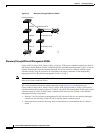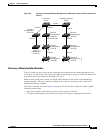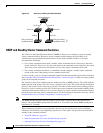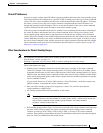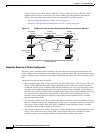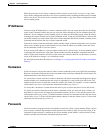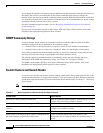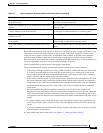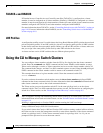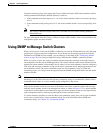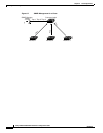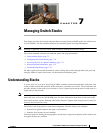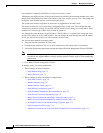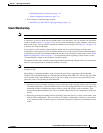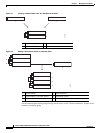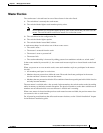
6-16
Catalyst 2960 and 2960-S Switch Software Configuration Guide
OL-8603-09
Chapter 6 Clustering Switches
Using the CLI to Manage Switch Clusters
TACACS+ and RADIUS
If Terminal Access Controller Access Control System Plus (TACACS+) is configured on a cluster
member, it must be configured on all cluster members. Similarly, if RADIUS is configured on a cluster
member, it must be configured on all cluster members. Further, the same switch cluster cannot have some
members configured with TACACS+ and other members configured with RADIUS.
For more information about TACACS+, see the “Controlling Switch Access with TACACS+” section on
page 9-10. For more information about RADIUS, see the “Controlling Switch Access with RADIUS”
section on page 9-18.
LRE Profiles
A configuration conflict occurs if a switch cluster has Long-Reach Ethernet (LRE) switches that use both
private and public profiles. If one LRE switch in a cluster is assigned a public profile, all LRE switches
in that cluster must have that same public profile. Before you add an LRE switch to a cluster, make sure
that you assign it the same public profile used by other LRE switches in the cluster.
A cluster can have a mix of LRE switches that use different private profiles.
Using the CLI to Manage Switch Clusters
You can configure cluster member switches from the CLI by first logging into the cluster command
switch. Enter the rcommand user EXEC command and the cluster member switch number to start a
Telnet session (through a console or Telnet connection) and to access the cluster member switch CLI.
The command mode changes, and the Cisco IOS commands operate as usual. Enter the exit privileged
EXEC command on the cluster member switch to return to the command-switch CLI.
This example shows how to log into member-switch 3 from the command-switch CLI:
switch# rcommand 3
If you do not know the member-switch number, enter the show cluster members privileged EXEC
command on the cluster command switch. For more information about the rcommand command and all
other cluster commands, refer to the switch command reference.
The Telnet session accesses the member-switch CLI at the same privilege level as on the cluster
command switch. The Cisco IOS commands then operate as usual. For instructions on configuring the
switch for a Telnet session, see the “Disabling Password Recovery” section on page 9-5.
Note The CLI supports creating and maintaining switch clusters with up to 16 switch stacks. For more
information about switch stack and switch cluster, see the “Switch Clusters and Switch Stacks” section
on page 6-14.
Stacking is supported only on Catalyst 2960-S switches running the LAN base image.
Catalyst 1900 and Catalyst 2820 CLI Considerations
If your switch cluster has Catalyst 1900 and Catalyst 2820 switches running standard edition software,
the Telnet session accesses the management console (a menu-driven interface) if the cluster command
switch is at privilege level 15. If the cluster command switch is at privilege level 1 to 14, you are
prompted for the password to access the menu console.



